US Envoy Vows Sanctions On Anyone Helping Iran’s Arms Supply To Russia

Special Envoy for Iran Rob Malley says the US will continue to expose the Islamic Republic’s support for the Russian invasion of Ukraine.

Special Envoy for Iran Rob Malley says the US will continue to expose the Islamic Republic’s support for the Russian invasion of Ukraine.
In an interview with Al Arabiya published on Thursday, he said, “I think it’s clear that Iran has moved closer to Russia. We think it’s a very bad bed that Iran has made, but it’s clear to the world today that Iran has sided with Russia and its war of aggression against Ukraine.”
Amid international outcry over the Islamic Republic’s supply of drones and ballistic missiles to Moscow, Kiev said earlier in the week that Tehran plans to ship even more arms to Russia. Ukranian intelligence agencies claimed that the Islamic Republic is set to deliver more than 200 Shahed-136 and Arash-2 kamikaze drones, and Mohajer-6 reconnaissance and combat UAVs later in November.
Malley added that “It’s something that we have exposed, that others have exposed, and I think … the first step to take is to make sure the world knows to run, and people know what their government is doing,” noting that “it’s clear as well that the Iranian government is embarrassed by that because they keep denying that they’ve transferred these drones to Russia in the face of mounting and incontrovertible evidence.”
He vowed more punitive measures against “anyone who is related even tangentially to those transfers,” warning that “Any economic operator in the region, or elsewhere, should be very careful about involving themselves in such transfers because we will sanction them.”
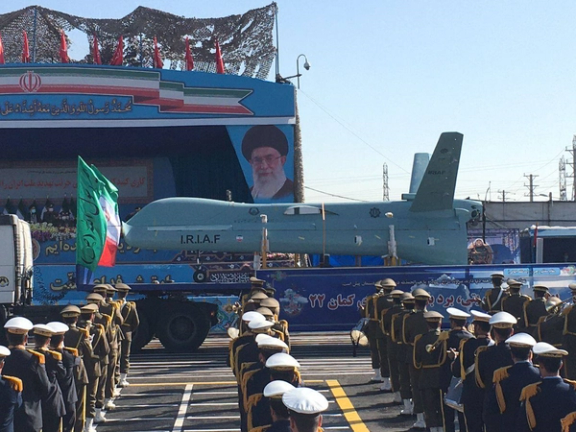
With the reported use of Iranian drones by Russia, the United States and its European allies face the question of reviving international sanctions by ‘snapback’.
What is ‘snapback,’ and why does it matter?
The 2015 Iran nuclear agreement, the JCPOA (Joint Comprehensive Plan of Action), lifted international sanctions against Iran in return for strict limits on the Iranian nuclear program. Under the terms of the JCPOA, the sanctions could ‘snapback’ if Iran violated the agreement.
Is Iran violating the agreement?
Iran began breaching JCPOA limits – for example on the level of uranium enrichment, and with the number and kind of centrifuges in use – in 2019, the year after President Donald Trump withdrew the US from the 2015 agreement and imposed ‘maximum pressure’ sanction.
So why is ‘snapback’ being raised now?
It has come up because France, Germany, the United States and the United Kingdom have told the United Nations that Iran’s reported supply of military drones to Russia for use in Ukraine violates UN Security Council Resolution 2231, by which the council endorsed the JCPOA.
UNSC Resolution 2231 contained a clause that up to October 2023 prior UNSC approval would be needed for the transfer to and from Iran of certain military equipment and weapons. So, the US is arguing that Iran’s supply of drones violates that clause – and this has raised the possibility of snapback, under which multilateral sanctions would come back onto Tehran.
Would the drone supply for sure violate Resolution 2231?
That is yet to be decided. Snapback relates to “significant non-performance of commitments.” Resolution 2231 refers to a 79-page document submitted at the time by the US – S/2015/546 – that listed categories of weapons needing prior UNSC approval. S/2015/546 refers to drones “capable of delivering at least a 50kg payload to a range of at least 300km,” and while Iranian-made Shahed drones can have a range of over 1,000km they carry 40kg of explosives. There would be a clearer violation if Iran transferred Fateh-110 and Zulfiqar missiles, which would meet the criteria.
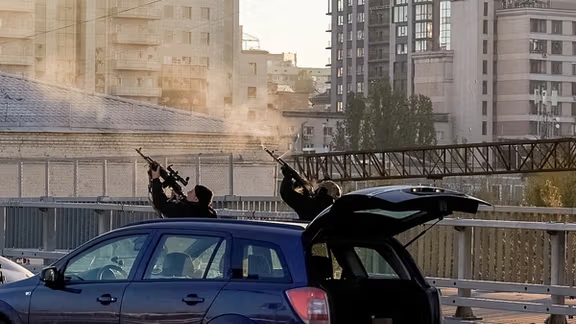
How would ‘snapback’ work?
Any party to the JCPOA can move snapback. If after 30 days, the issue is not resolved, then UN sanctions would come back into effect. For the issue to be resolved, a UNSC member would need to move that sanctions not come back into play, and this could be vetoed by any other member.
This was the basis for the claims from President Barack Obama and Secretary of State John Kerry at the time the JCPOA was signed that Russia, or China, could not stop snapback. It’s as if the veto power is reversed.
But can the US move ‘snapback’? Didn’t it leave the JCPOA?
When the Trump administration tried to move snapback in 2020, other JCPOA members, including the three European signatories (France, Germany, and the UK) said it couldn’t because it had left the agreement.
But this interpretation has been challenged. Gabriel Noronha, an Iran advisor 2019-21 in the Trump administration, argued in tweets this week that the US could move snapback. Noronha’s tweets cited Obama, Kerry, and then vice-president Biden.
What would be the practical effect of snapback?
Some say the ‘bark’ would be worse than the ‘bite.’ For Europe to reimpose sanctions on Iran would make little difference given its trade has massively decreased under US ‘maximum pressure,’ under which any third party can be sanctioned by the US for any Iran dealings. Iran is already unable to access significant funds frozen around the world. Russia and China might just argue that the US undermined the JCPOA and is in no position to cite it as a justification for any actions.
What are US intentions?
In a press briefing Tuesday, State Department Spokesman Ned Price was unenthusiastic over snapback, although his references to a possible Russian veto were speedily rebutted by Noronha. Price referred to other means of restricting Iran-Russia links, including recent US sanctions on Iranian defense companies and generals.
It may be Washington is not so concerned over Iranian-made drones – which are useful to Russia but less effective in the conflict than the publicity might suggest – and that its greater worry is the possible transfer of missiles. US strategy, as explained by Price, is to run down Russia’s military capacities, in the hope either of Moscow’s defeat or a negotiated settlement. In October US, France, Germany and the UK wrote a letter to the UN secretariat asking for an investigation of the alleged Iranian drone supply – and that’s where things stand at present.
How is the Ukraine war impinging on talks to revive the JCPOA?
Another reason for the US not moving snapback might be the logic, inherent in the JCPOA, that the nuclear file can be kept largely separate from other issues. Given critics of the agreement argue such separation is difficult, if not impossible, the Biden administration is saying it can take stringent measures against Iran – over missiles, or treatment of protests – while continuing its efforts to revive the JCPOA. Only time will tell if they are right.
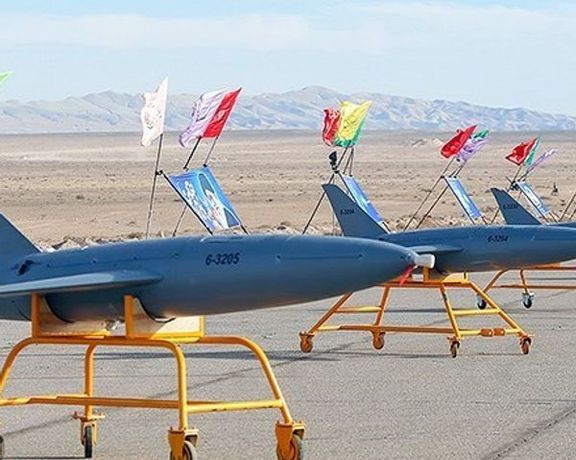
Amid international outcry over the Islamic Republic’s supply of drones and ballistic missiles for the Russian invasion of Ukraine, Kiev says Tehran plans to ship even more arms to Russia.
According to reports by Ukranian intelligence agencies, the Islamic Republic is set to deliver more than 200 Shahed-136 and Arash-2 kamikaze drones, and Mohajer-6 reconnaissance and combat UAVs later in November.
“It is known that the supply of these UAVs will be carried out over the Caspian Sea to the port of Astrakhan,” the Ukrainian intelligence agency said, adding that “The drones will arrive disassembled. Later, on the territory of Russia, they will be assembled, repainted and applied with Russian markings,” the report says. Russia applies its own markings to the Shahed-131 and the Shahed-136, dubbing them the Geran-1 and Geran-2 respectively – apparently to obscure their Iranian origins.
According to a report by CNN, Tehran is preparing to send approximately 1,000 additional weapons, including surface-to-surface short range ballistic missiles and more attack drones to Russia to use in its war against Ukraine.
The Paris-based dissident organization National Council of Resistance of Iran (NCRI) -- affiliated with exiled People’s Mojahedin Organization of Iran (PMOI/MEK) -- accused the Iranian regime of supplying Vladimir Putin’s army with more than 3,500 drones.
Ukraine, however, said that roughly 400 drones have already been used by Russia, from a total supply of approximately 2,000 weapons. President Volodymyr Zelenskyy announced the downing of 223 drones produced by Iran’s regime.
On Tuesday, the US State Department Spokesperson Ned Price said Washington will “continue to vigorously enforce all US sanctions on both the Russian and Iranian arms trade to make it harder for Iran to sell these weapons to Russia.”
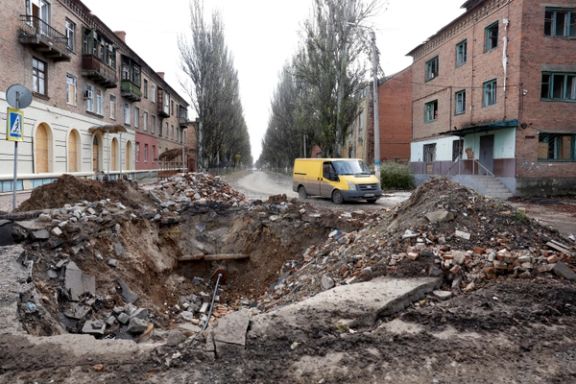
The administration of President Joe Biden struggles to maintain a coherent Iran policy under different pressures heightened by the Ukraine war.
In a press briefing Tuesday United States State Department spokesman Ned Price faced questions as to what the US planned to do over alleged Iranian arms supplies to Russia. His answer over US options at United Nations led to a Twitter feed where his claims were rejected by Gabriel Naronha, Iran advisor 2019-21 during the Trump administration.
Price argued that the US was pursuing “every relevant and appropriate tool in our tool kit” to curb Iran’s reported supply of military drones, including sanctioning Iranian commanders and defense companies.
Price was less than enthusiastic over pushing at the UN Security Council (UNSC) for the ‘snapback’ of UN sanctions against Iran on the basis that such arms supplies violate UNSC resolution 2231, passed in 2015 to endorse the 2015 Iran nuclear agreement, the JCPOA (Joint Comprehensive Plan of Action).
“You know as well as anyone,” Price told a journalist, “that any effort to…stitch together a coalition in the UN Security Council, where you have the belligerent Russia as a permanent member with a veto – that any effort to stitch back together what has expired probably would not fare too well in the UN Security Council.”
The spokesman also suggested US options over snapback were compromised by leaving the JCPOA in 2018. But Price’s description of the mechanics of ‘snapback’ was contradicted by Naronha saying Russia would not hold a veto in such circumstances.
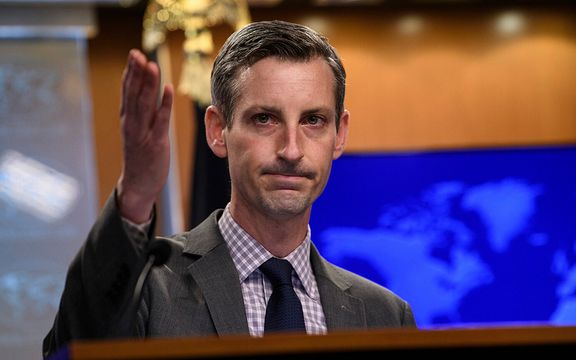
However technical the arguments, any linkage between the Ukraine war and the JCPOA weakens the contention of supporters of the 2015 agreement that nuclear proliferation measures should be dealt with separately.
Pledged to revive the JCPOA, the Biden administration has conducted over a year of talks with Iran without reaching agreement. With negotiations currently frozen, Biden officials – including special envoy Rob Malley in a Carnegie Endowment discussion Monday – have insisted that their intention remains JCPOA restoration.
At the same time, the US is keen that the Ukraine war not escalate. Despite sending at least $17 billion in military aid to Kyiv, Washington has refused advanced weapons. Price said Tuesday that Russia’s military position had been “significantly degraded,” with its “sophisticated weaponry and technology” curbed both through battlefield loses and US restrictions on its international access to chips and sensors needed for drones and missiles.
On the ‘same page’ with Europe
Another US vista, over both Ukraine and Iran, is its relationship with Europe. Malley stressed in his Carnegie Endowment talk on the way the Biden administration had overcome divisions with the Europeans left by the Trump presidency.
While Malley said Monday that reviving the JCPOA was “not our focus now,” he argued that Trump’s maximum pressure “didn’t work” and was “a real-life experiment that failed.” By contrast, he argued “there is nothing we are not doing now because of a possible nuclear deal in the future” and that “we and Europe are completely on the same page when it comes to reacting to Iran's nuclear program.”
The US and Europe, Malley said were “standing together shoulder-to-shoulder and expressing support for the Iranian people at this time when they are confronting the violence of the regime…we really have succeeded in re-stitching what is so crucial if we want to have a common front to push back against Iran's destabilizing activities, human rights violations, or nuclear program.”
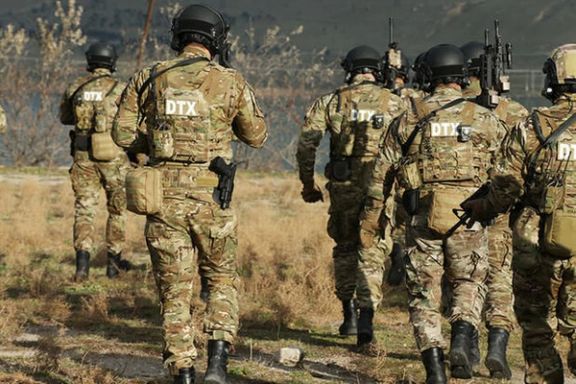
Azerbaijan says it has arrested a group of its citizens who had been “trained and funded by Iran's intelligence” to act against the interests of Azerbaijani national security.
Azerbaijan says it has arrested a group of its citizens who had been “trained and funded by Iran's intelligence” to act against the interests of Azerbaijani national security.
The country’s State Security Service announced on its website Tuesday that the armed group, called the Muslim Unity Movement, was secretly formed by Iran's special intelligence service through the inculcation of "radical-extremist religious ideas."
After recruitment, the members of the group were taken to Tehran through third countries, were given religious nicknames, and were transferred to Syria on military cargo planes with fake documents. In Syria, they underwent military training and received funding.
They were involved in military exercises where they were taught using different firearms and combat tactics as well psychological warfare such as “the use of blackmail.” Following their training, they brought books and videos which propagated "radical, religious-extremist attitudes against the ideas of modern development and a secular state."
Azerbaijan’s State Security Service said the leader of the group was arrested by a court order in 2018 for similar criminal acts. The statement named several of the members of the group, alleging that they are currently hiding in Iran. One of the suspects was arrested while "attempting a terrorist act" against Israeli billionaire Teddy Sagi in Cyprus.
Relations between Baku and Tehran have been tense in recent years, especially after the Islamic Republic sided with Armenia in their territorial disputes. Tehran in the past has also expressed alarm at alleged Israeli military presence in Azerbaijan.
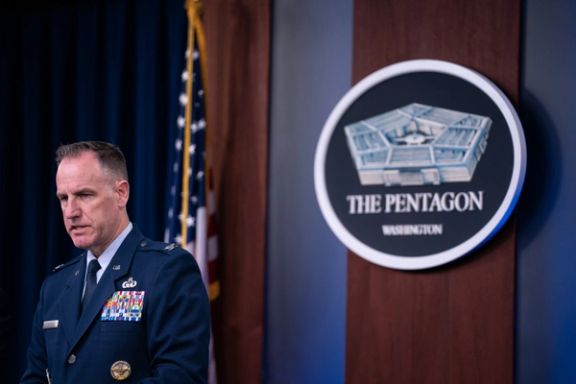
The US has expressed concerns about imminent threats by the Islamic Republic against Saudi Arabia, warning that it will not hesitate to respond if necessary.
A spokesperson from the National Security Council of the White House said on Tuesday that "We are concerned about the threat picture, and we remain in constant contact through military and intelligence channels with the Saudis. We will not hesitate to act in the defense of our interests and partners in the region."
The official made the remarks after the Wall Street Journal reported that Saudi Arabia has shared intelligence with the United States about attacks on targets in the kingdom as well as in Iraqi Kurdistan capital of Erbil, where US troops are located.
Pentagon press secretary Air Force Brigadier General Pat Ryder said during a press briefing Tuesday that the US remains "concerned" about "the threat situation in the region" and is "in regular contact" with Saudi officials.
"We will reserve the right to protect and defend ourselves no matter where our forces are serving, whether in Iraq or elsewhere," Ryder said, without disclosing information about any specific threat.
In mid-October, Iran warned Saudi Arabia against covering the protests on Persian news stations and has accused Saudi Arabia, Israel and the US of being responsible for them.
Commander of Iran’s Revolutionary Guard Hossein Salami claimed that Saudis are trying to provoke the Iranian youth, and threatened that if they do not control their media the consequences will be unavoidable. “This is our last warning, because you are interfering in our internal affairs through these media, we told you, be careful,” he said.